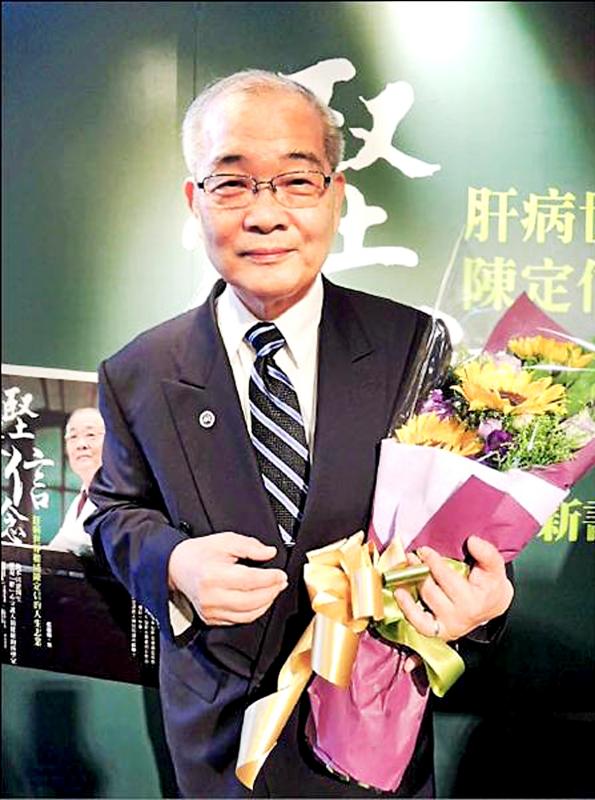Academia Sinica’s Chen Ding-shinn (陳定信), the nation’s leading authority on hepatitis, died from pancreatic cancer at National Taiwan University Hospital on Wednesday. He was 76.
Born on July 6, 1943, in then-Taipei County’s Yingge Township (鶯歌), Chen was a student of National Taiwan University College of Medicine professor Sung Juei-low (宋瑞樓), dubbed the Taiwanese father of liver disease research.
Chen attributed his dedication to the study of liver diseases to his father dying of liver cancer when he was in his senior year in college and to his contracting hepatitis A when he was in elementary school.

Photo: Yang Yuan-ting, Taipei Times
He was in the original group that persuaded the government to introduce hepatitis B preventive measures, leading to the government’s introduction of a mass vaccination program in 1984, the first nation in the world to do so.
To overcome public resistance to the program, Chen and Sung appeared on TV and radio to promote it.
To date, the program has benefitted 8 million Taiwanese.
Chen and his team finalized the genetic sequencing of the Taiwan strain of the hepatitis C virus, paving the way for the development of a treatment using short-term interferon alongside Ribavirin.
That became the foundation for the development of a treatment using long-term interferon with Ribavirin.
Although Chen retired in 2013, he continued to go to his office daily to conduct research and teach students during clinical treatment sessions, National Taiwan University Hospital vice superintendent Wu Ming-shiang (吳明賢) said.
A doctor can only save one life through treatment, but through top-notch research, they can help many, Wu quoted Chen as saying, adding that Chen was a role model for Taiwanese physicians.
Chen’s decision to remain in Taiwan was a boon for the nation’s medical sector, Wu said, citing how Chen had saved the Gastroenterological Society of Taiwan by virtue of his reputation alone when the society was at risk of being removed from the World Gastroenterological Organization due to Chinese interference.
Academia Sinica on Wednesday night also issued a statement in remembrance of Chen.
Chen’s research on hepatitis B and C, and his influence on related policymaking, made Taiwan a world leader in liver disease research, Academia Sinica President James Liao (廖俊智) said.
Over the past few months, Chen also served as a consultant for the institution’s team researching COVID-19, even though he was unwell, Liao said, expressing deep regret over losing such a valuable mentor.
Additional reporting by Yang Yuan-ting and Lin Chia-nan

POSITIVE DEVELOPMENT: Japan and the US are expected to hold in-depth discussions on Taiwan-related issues during the meeting next month, Japanese sources said The holding of a Japan-US leaders’ meeting ahead of US President Donald Trump’s visit to China is positive news for Taiwan, former Japan-Taiwan Exchange Association representative Hiroyasu Izumi said yesterday. After the Liberal Democratic Party’s landslide victory in Japan’s House of Representatives election, Japanese Prime Minister Sanae Takaichi is scheduled to visit the US next month, where she is to meet with Trump ahead of the US president’s planned visit to China from March 31 to April 2 for a meeting with Chinese President Xi Jinping (習近平). Japan and the US are expected to hold in-depth discussions on Taiwan-related issues during the

‘LIKE-MINDED PARTNER’: Tako van Popta said it would be inappropriate to delay signing the deal with Taiwan because of China, adding he would promote the issue Canadian senators have stressed Taiwan’s importance for international trade and expressed enthusiasm for ensuring the Taiwan-Canada trade cooperation framework agreement is implemented this year. Representative to Canada Harry Tseng (曾厚仁) in an interview with the Central News Agency (CNA) said he was increasingly uneasy about Ottawa’s delays in signing the agreement, especially as Ottawa has warmed toward Beijing. There are “no negotiations left. Not only [is it] initialed, we have three versions of the text ready: English, French and Mandarin,” Tseng said. “That tells you how close we are to the final signature.” Tseng said that he hoped Canadian Prime Minister Mark Carney

President William Lai (賴清德) yesterday bestowed one of Taiwan’s highest honors on Saint Vincent and the Grenadines (SVG) Ambassador Andrea Clare Bowman in recognition of her contributions to bilateral ties. “By conferring the Order of Brilliant Star with Grand Cordon on Ambassador Bowman today, I want to sincerely thank her, on behalf of the Taiwanese people, for her outstanding contribution to deepening diplomatic ties between Taiwan and SVG,” Lai said at a ceremony held at the Presidential Office in Taipei. He noted that Bowman became SVG’s first ambassador to Taiwan in 2019 and

A man walks past elementary school artworks at the Taipei Lantern Festival in Ximen District yesterday, the first day of the event. The festival is to run from 5pm to 10pm through March 15.